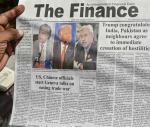You are here
Will Jeddah summit broker a peace plan acceptable to Russia, Ukraine and NATO
Aug 02,2023 - Last updated at Aug 02,2023
This weekend's meeting in Jeddah of officials from a wide range of countries aims at formulating a common approach to peacemaking between Ukraine and Russia. The gathering has been called by Ukraine, which seeks to appeal for support for its peace plan from countries critical of Kyiv and supportive of Russia. Saudi Arabia has hosted the gathering because it wants to boost its role as peacemaker and increase its standing on the international stage. The US and its Western allies are determined to exert pressure on fence-sitting countries to align with Ukraine and NATO. The event will not gain traction with Russia which has not been invited.
The Jeddah gathering will follow a June meeting in Copenhagen which was attended by Brazil, India, Turkey and South Africa but did not convince them to get off the fence. Among the 30 invitees to this event are Chile, Egypt, the European Union, Indonesia, Mexico, Poland, Britain, the US and Zambia, according to the Wall Street Journal. If a common approach is formulated, Ukraine and its Western allies would call for a peace summit later in the year. The coming round of discussions are set to focus on Ukrainian President Volodymyr Zelensky's maximalist 10-point peace formula put forward last November. It is a non-starter with Russia unless there are major amendments. While Russia could accept security provisions involving the nuclear power plant and food and energy, mutual prisoner releases, environmental protections and restoration of water treatment plants, the core provisions are unacceptable to Moscow. These are Zelensky's call for total withdrawal of Russian forces, restoration of Ukrainian sovereignty (which would include the return of Crimea and the Donbas to Ukraine), and accountability for alleged war crimes.
The initial response of Ukraine's Western allies to the plan was cautious. Secretary General Antonio Guterres warned in December that "we'll still have to wait for a moment [when] serious negotiations for peace will be possible".
The moment could be now. The dictum holds, Ukraine will "not get at the negotiating table what it does not achieve on the battlefield". Ukraine’s touted, repeatedly delayed counter-offensive, now two months old, has not yet yielded a major Russian roll-back. Instead, Ukraine is struggling to overcome stalemate and a static war of attrition.
About the time Zelensky issued his dodgy proposal, US military chief General Mark Milley, speaking at The Economy Club of New York, called Russia's invasion of Ukraine a "tremendous strategic mistake". Which it certainly was because Russia did not muster the military muscle to win a strategic victory in short order and the war has turned into a protracted slog for both sides.
While Milley said the US would carry on arming Ukraine even if military victory for neither side seemed likely, he argued, "When there’s an opportunity to negotiate, when peace can be achieved, seize it. Seize the moment." The Biden administration has ignored the general's advice and counted on Ukraine's counteroffensive to achieve military advances which would boost its prospects during negotiations.
However, Russia has put to good use the time Ukraine has been preparing its counteroffensive. CNN reports that Moscow's military has constructed “multiple layers of Russian fortifications" which are 20 kilometres wide in some areas, and include tank traps, mines, booby traps and obstacles. Russian aircraft target "weaknesses in Ukraine's air defences, enabling Russians to strike Ukrainian ground forces", George Barros of the Washington-based Institute for the Study of War told CNN. Both sides are short of ammunition and are using North Korean artillery shells. Ukraine has received an injection of US cluster bombs which are banned by 123 states.
While Russia has deployed sufficient manpower to hold the line, until recently Ukraine had been relying on platoon and company level formations rather than brigades to break through Russian defences. Experts say it is not clear whether Ukraine has increased the level of deployment. To distract from his forces failure to achieve expected results from the counteroffensive, Zelensky had said Ukraine is taking the war to Russia by sending armed drones to strike Russian office blocks in Moscow. While these incidents are mainly symbolic, Russia replies with punitive air strikes against residential facilities in Ukrainian towns and cities.
In an interview with The Grayzone, US academic John Mearsheimer was critical of the US and its NATO allies who not only did nothing to prevent war but even encouraged war. They held the belief that the Ukrainian armed forces could hold their own on the battlefield and Russia would be finished off by sanctions. The Western thinking, he said, was that the Ukrainians would end up defeating the Russians, and [the Ukrainians] would then be in a position where we could admit them into NATO."
He said this thinking was faulty. "The Russians believe that they’re facing an existential threat in Ukraine, and when you are facing an existential threat, or you think you are facing an existential threat, you are willing to absorb huge amounts of pain to make sure that you are not defeated on the battlefield". In his view, "sanctions were doomed" because sanctions could not do great harm to Russia, a vast country with huge resources.
Russia has also opened an economic front by blocking Ukraine's grain and cooking oil exports which reached 33 million tonnes while the August 2022 deal to open Black Sea shipping was in force. In 2021, before the war, Ukraine’s grain exports amounted to more than $5 billion. Russia has also attacked Ukrainian manufacturing and power plants, grain silos, railways and roads, with the aim of degrading the country’s economy. This process will continue as long as the war of attrition goes on.
It is therefore, to the advantage of Ukraine and its allies to follow General Milley’s advice and, while In Jeddah, come up with a peace plan acceptable to Russia as well as Ukrainian and NATO hawks.













